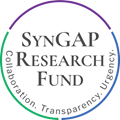Story
Join us in fundraising to further develop an AAV gene therapy for SYNGAP1!
What is SYNGAP1?
SYNGAP1-related non-syndromic intellectual disability is a rare genetic disorder caused by a variant on the SYNGAP1 gene. The SYNGAP1 gene is located on Chromosome 6 and is responsible for producing the SynGAP protein. This protein acts as a regulator in the synapses - where neurons communicate with each other. A variant of the SYNGAP1 gene leads to the gene not producing enough SynGAP protein. Without the right amount of SynGAP protein we see an increase in excitability in the synapses making it difficult for neurons to communicate effectively. This leads to the highly complex and severe neurological symptoms seen in SynGAP patients such as intellectual disability, epilepsy, low muscle tone, motor delays, autism, coordination disorder, sensory processing disorder, dyspraxia, speech delay/apraxia as well as sleep, feeding and behaviour disorders, all of which contribute to a much reduced quality of life.
There are currently over 1000 known people with SYNGAP1 worldwide, with approximately 10% residing in the UK (see syngap.fund/census for details). Many more are yet to be diagnosed.
What's an AAV?
AAVs are small, benign viruses that can be programmed to deliver gene therapies. They produce a minimal immune response in humans and have been used in various ways to deliver gene therapies to treat complex genetic disorders. An AAV-based therapy, Zolgensma, was approved for Spinal Muscular Atrophy in 2019 and several more AAV-based therapies are in clinical trials.
SRF's approach to funding research
Therapeutics for rare diseases like SYNGAP1 require a multi-modality approach. SRF has to-date funded various projects across multiple modalities: drug screens and research into repurposing small molecule drugs as well as funding research and development of Antisense oligonucleotides. This is our first foray into funding viral gene therapies to treat SYNGAP1. In addition to drug development, we continue to fund supportive translational work such as natural history studies, biomarker and endpoint development, model development (iPSC lines and animal models) as well as projects to diagnose more SYNGAP1 patients.
Why Professors Cobb & Kind?
Professor Stuart Cobb is the Lab Head at the Patrick Wild Centre and Simons Initiative for the Developing Brain, University of Edinburgh. He is also Chief Scientific Officer at Neurogene Inc. Professor Cobb heads a translational research laboratory that is focused on developing genetic therapies for severe neurological and neurodevelopmental disorders. His research aims to address the tractability of severe brain disease to genetic rescue and to develop innovative therapeutic solutions for clinical translation. Research highlights include the original ground-breaking genetic rescue results in Rett syndrome, and his group was the first to report the ameliorative effect of gene therapy in mice modelling the disorder. His laboratory has developed a number of novel gene therapy approaches optimized for efficacy and safety. This includes the development of regulated expression cassettes, minigene and RNA based approaches. He was a founding member of the RSRT Gene Therapy Consortium. Since late 2018 he has been Chief Scientific Officer at Neurogene, a genetic therapy company focusing on rare neurological disease. Neurogene recently announced FDA clearance of IND for NGN-101 - an AAV gene therapy to treat CLN5 Batten Disease, a rare and fatal neurodegenerative disorder with no approved disease-modifying therapies available.
Professor Peter Kind is Director of the Patrick Wild Centre for Research into Autism, Fragile X Syndrome (FXS) and Intellectual Disability and Professor of Developmental Neuroscience at the University of Edinburgh. He is also Director of the Simons Initiative for the Developing Brain and Associate Director at the Centre for Brain Development and Repair (CBDR) at the Institute for Stem Cell Biology and Regenerative Medicine (Instem), Bangalore, India. Professor Kind's research examines the cellular basis of autism spectrum disorder (ASD) and intellectual disability (ID). The experimental aims of his laboratory are to determine the cellular basis of autism spectrum disorders and intellectual disability that primarily arise from dysfunction of the synapse. The long-term goal is to translate these findings into therapeutic strategies for treating these developmental disorders.
Where will my donation go?
Thank you for supporting our campaign. Further development of an AAV gene therapy for SYNGAP1 gets patients closer to treatments that have the promise of improving their quality of life by reducing seizures, improving cognition and reducing symptoms. We are proud to say 100% of your donation will go to the AAV research project because the SRF founders cover all overheads associated with running the charity.
 Campaign by
Campaign by 